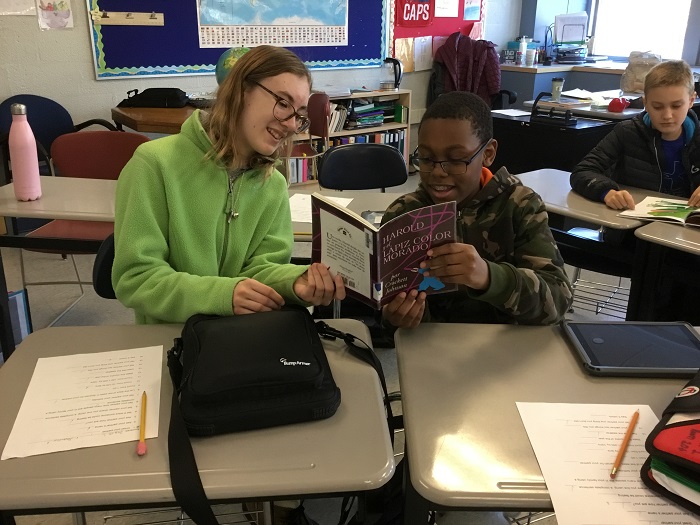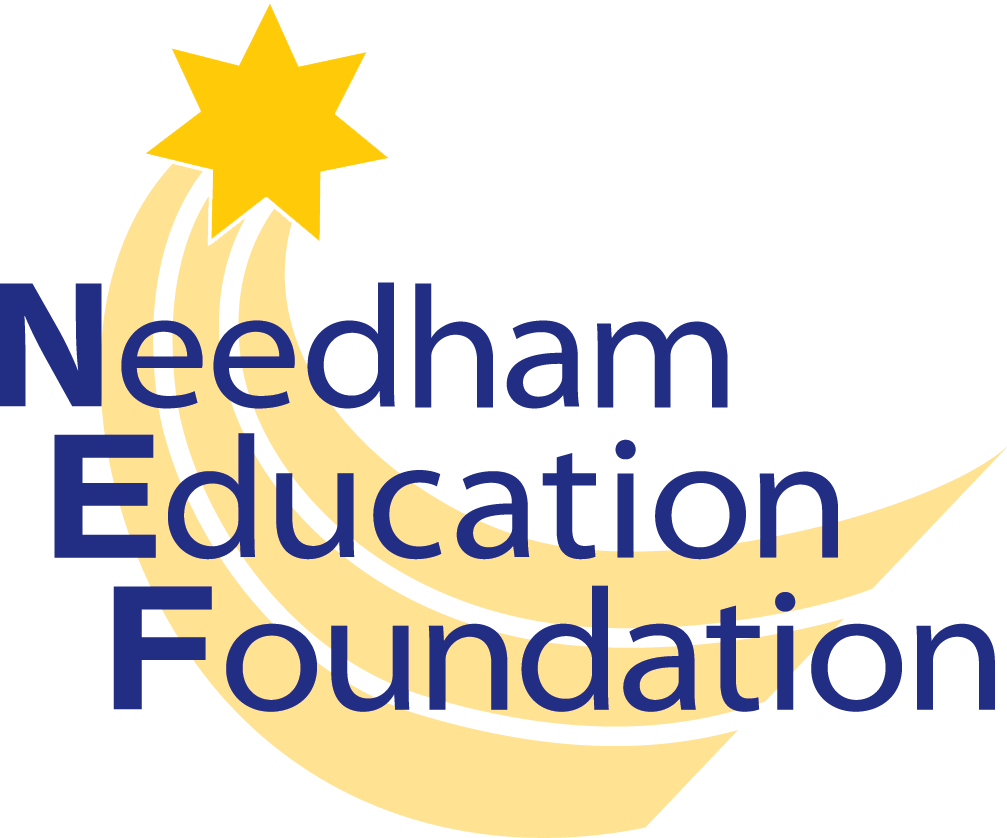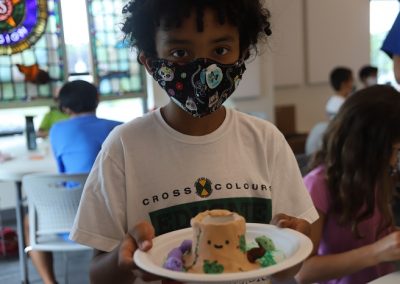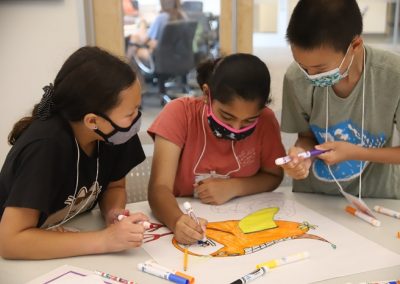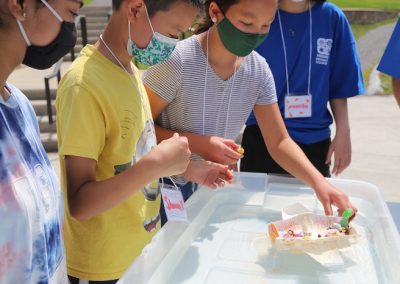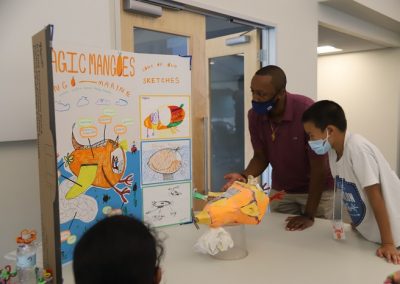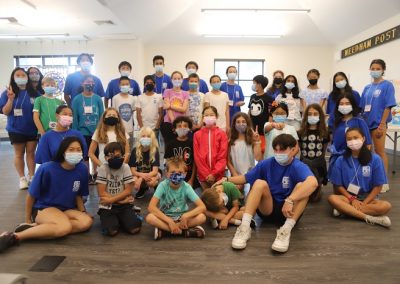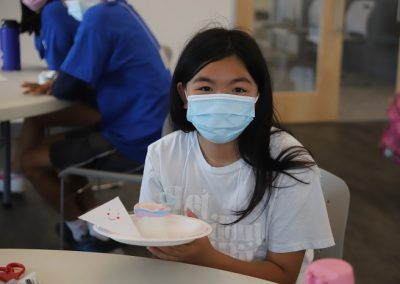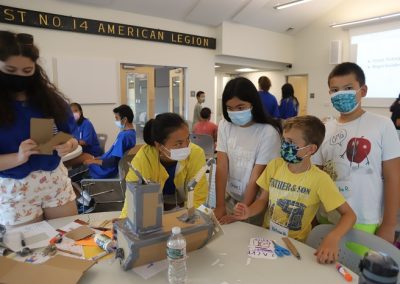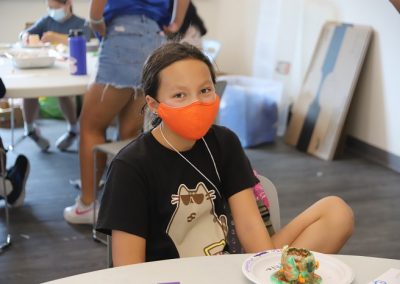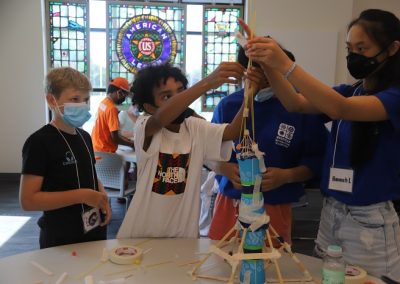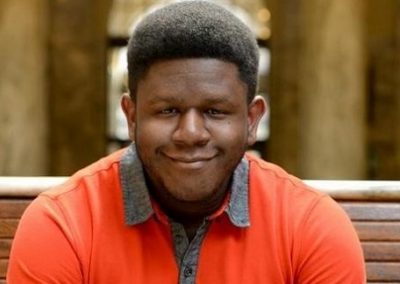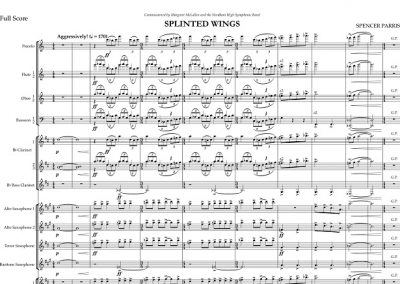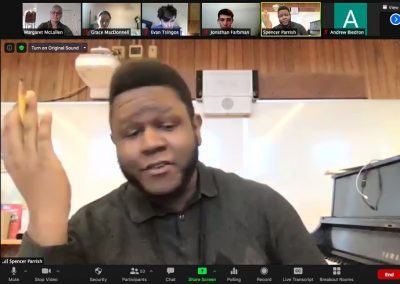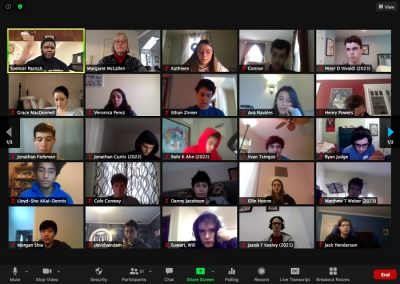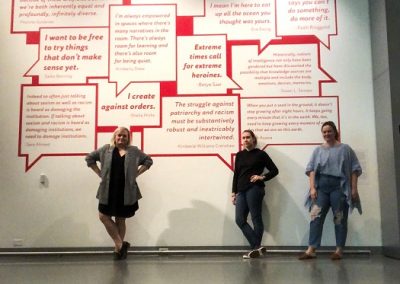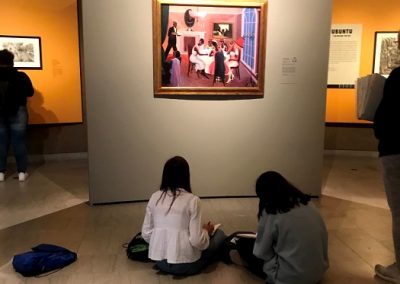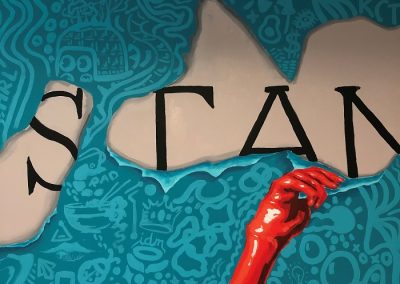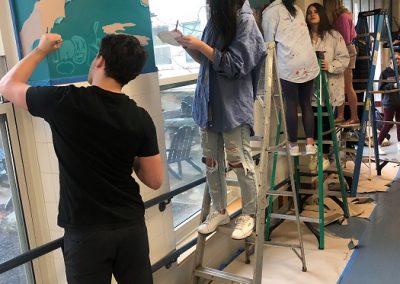Needham Young STARs
This past summer, the NEF funded the Needham Young STARs (Science Technology and Arts Researchers) program organized by Needham High School students Kate Paik and Derek Yang.
The free, open-to-all, four-day STEM workshop for 4th through 6th graders was designed to cultivate more interest in STEM in the Needham community. The program drew 30 participants and over 15 volunteers. Needham Park and Recreation hosted the event at Memorial Park.
Students worked on various team-based engineering challenges and explored chemical reactions through rockets and volcanoes. Throughout the week, groups of students worked on a final project that focused on The Great Pacific Garbage Patch.
At the end of the program, parents were invited to a mock science symposium to view the students’ projects. Town Select Board member Marcus Nelson also stopped by to see the projects and acknowledge the hard work everyone put into the program.
Grant writers, Kate Paik and Derek Yang explained the motivation to create this program: “Growing up we have both attended many similar STEM-focused summer camps which have inspired us to pursue careers in the sciences.” They wanted to “give back to our community and share our love for STEM with the next generation of engineers, mathematicians, and scientists.” It was important to them that the program be free to participants “to promote a more open and equitable introduction to STEM for young scientists.” The NEF was proud to support this enriching program for Needham Public School students with a special interest in STEM.
Where You Can Compose Your Own Story
By Kathleen Grady and Christine Mittaz
In a year pitted against band, Needham High School’s Band program has been able to create something special nonetheless. In the summer, Margaret McLallen (Ms. McLallen to us), entertained the possibility of having a special band piece that was composed just for Needham High’s band ensembles. Through the Needham Education Foundation (NEF) Small Grant, Parent Teacher Council (PTC) Enrichment Grant, and Needham Friends of Music, Ms. McLallen was able to get three pieces commissioned and completed by March. This, of course, would not be possible without the incredible composer, musician, teacher, and overall person, Spencer Parrish.
We met Mr. Parrish last January when he began student teaching at Needham High School. He worked with the bands through our concert in March, and during this time we got to see his passion for music first hand. He even continued virtually student teaching at Needham Elementary School, Broadmeadow, through the start of the pandemic and finishing the school year. But his start with Needham certainly wasn’t his start with music.
His parents noticed his ear for music when he was only five years old living in Rome, New York. He got their attention by walking over to a piano and perfectly playing the song just sung by the chorus at his Baptist church. By eight years old, he was playing the B3 organ for the church. Then at nine, he was promoted to the official music director and Hammond Organist. He began playing the piano at a young age but then picked up the trumpet as well in fourth grade, which he fondly recalls, “commenced [his] life-long love for the concert band idiom” (Parrish). At age 14, Spencer wrote, composed, and produced an entire 13 song R&B album by the name of Relate (available on Spotify, just search Spencer Parrish). Then by his senior year of high school (where he was notably salutatorian), Mr. Parrish set his life goals to be a musician and teacher.
To further pursue his music education, Mr. Parrish attended Berklee as a class of 2020 graduate. Here, he learned from top musicians and worked toward the opportunity to student-teach. He impressively graduated mid-pandemic and is now working as a music teacher in Newton Public Schools.
As a student teacher in Needham, Mr. Parrish observed throughout the fall of 2019 and began taking a more active role in teaching as the new year arrived. He led classes and provided his own insight and feedback as he grew closer with the band, and we became acquainted with his style. Connor Daly, a jazz and symphonic trumpet player summarized this by saying, “He was a great teacher. He had a different approach- but still worked well with Ms. McLallen to teach,” (Parrish).
While we and the rest of the band program were sad to bid Mr. Parrish farewell, our excitement for his future ultimately put us at ease. Little did we know, Mr. Parrish’s career would lead him right back to Needham just months later through the inspiration and planning of Ms. McLallen. When looking back on his experience, Mr. Parrish shared: “My student-teaching experience at Needham High is a moment in time I will cherish forever. I am very grateful for the opportunity to work with the band program again this year, wearing a different hat this time,” (Parrish).
Ms. McLallen first reached out to Mr. Parrish in the summer of 2020 about her idea. She proposed the possibility of commissioning three pieces all composed by Mr. Parrish. With support from largely the Needham Education Foundation, this dream was able to become a reality. The NEF raises funds to provide grants and scholarships for the Needham Public Schools. These grants and scholarships hope to enhance the curriculum, inspiring the next generation of innovative learners. A huge thanks also goes out to the PTC and Needham Friends of Music, who also made the project possible. With the funding in place, Ms. McLallen and Mr. Parrish were now able to focus solely on the musical and educational aspects of the composition.
At first, the task seemed daunting, and Mr. Parrish recalls, “I was initially skeptical of my capacity to deliver three original works for such a large instrumentation in this timeframe. Through the power of careful planning, I did manage to deliver the third piece by the middle of March,” (Parrish). Simultaneously, we students followed Mr. Parrish’s process, and began learning and composing pieces (although much less complex) of our own. Through the guidance of Ms. McLallen and the advice from Mr. Parrish, we saw that the composition process was in fact quite familiar and similar to one we had been doing for years, writing essays.
Mr. Parrish explained the process as coming up with a thesis, or melody. Then developing central arguments that act as supplemental melodies to “connect musically with that main theme,” (Parrish). From there, musicians construct an outline with the general form of the piece. Following the framework, transitions are used to fill in the space between melodies, paralleling the part of an essay in which “it is time to commit words, sentences, and paragraphs to the page” (Parrish). Keep in mind, this process had to be repeated for roughly 25 parts for each of the three pieces, and original ideas do not always make the final piece. In fact, Mr. Parrish, “encountered several false starts and creative roadblocks” (Parrish). When we students started our comparatively easy and basic compositions (yet still quite daunting), it was inspiring to see the same process being done on a much bigger scale.
At the beginning of this school year, the logistics of mid-pandemic band class were certainly unknown. We began the year outside, enduring 40℉ classes, fly-away music, and the constant interruption by gym classes. In essence, the music world of NHS had little to be excited for. However, the introduction of the commissioned pieces provided a unique opportunity that motivated and inspired us to continue working hard despite these challenges. Our personal involvement in the process of the compositions changed the energy of the Needham High School Band. In such a bleak year, it was rewarding to see that the pieces were influenced by conversations we had had with Mr. Parrish. After all, music tells a story; Ms. McLallen and Mr. Parrish worked incredibly hard to create pieces that tell ours. The composition alone is truly fascinating (and challenging to play), and the story is not over yet. The last chapter of this process is a virtual recording that will be completed by the end of the 20-21 school year. With more updates to come, music to be made, and learning to be done, we look forward to sharing our hard work with the community.
“Your Voice Matters. What’s Your Story?”
Funded by a large grant from the NEF, ‘Your Voice Matters. What’s Your Story?’ is a multifaceted project that creates a platform for the Needham High School community to share their stories and connect with one another, while also creating spaces for students to think critically and empathically. The authors of the grant, Kate Bergeron, Robyn Briggs, and Nicole Burnor, worked closely with Maria Sartori and other members of the FPA department to make this project come alive.
The project involves the creation of a professional gallery space at the high school which will have rotating exhibitions of student artwork based around various themes. The first exhibition is to be a Fine & Performing Arts (FPA) Department curated art show, ‘Your Voice Matters, What’s Your Story?’ centered around the theme of empathy as it relates to equity.
While this inaugural exhibition was unable to take place in April as planned, many other components of the project have been accomplished and the work continues. According to the grant writers, before the abrupt COVID interruption last spring, they collaborated with a Boston-based community project duo, The Cauldron, who hosted a workshop on the high school’s One Day and taught a Master Class with the Senior Studios students. They also organized a FPA Department field trip to the Museum of Fine Arts to see the exhibition, Women Take the Floor. In addition, Senior Studios students collaborated to design and work on a permanent mural installation at Needham High School.
The grant writers also began, before the schools shut down, to order supplies for the new gallery space for visual and digital arts, Gallery 450’s, to be created in the new wing of the high school. These include items such as hanging supplies and display cases as well as a TV to exhibit digital art. They now continue to work on ordering supplies for the new gallery space.
And there are more benefits to come from this innovative program. As Nicole Burnor put it, “We are also looking forward to collaborating with Own Your Peace and to continue creating spaces for our students to build community and foster the value of diversity.”
Sensory Pathways at Eliot and Mitchell
This past year, the NEF funded Sensory Pathways to be installed at Eliot and Mitchell over the summer. The Sensory Pathways are for students to use when they need a movement or therapeutic break. The Eliot and Mitchell grants were funded through NEF’s “Express Grants” option, which facilitates the replication of successfully implemented small grant programs from one school to another school. The first Sensory Pathways were funded and installed at Broadmeadow last year. They immediately made a huge impact on the students and teachers by giving students opportunities to release their energy and sensory build-ups that impact their ability to succeed in the classroom. (See them in action here!)
Children can jump, bounce, and bend their way through the colorful, playful pathway decals in the hallways as they transition from one class to another or when they require a movement or therapeutic break. Importantly, all children can benefit academically, physically, and emotionally from the release of energy and sensory build-up, regardless of whether they are a general education student or have specific attentional, sensory, or mental health needs.
At Eliot, one pathway is located in a high traffic area and the second pathway is located in a quieter wing upstairs. At Mitchell, one pathway was installed in the kindergarten modular building and the second pathway in the grades 1-2 wing.
The photos below show what greeted Eliot students when they returned to school in-person this week, ready to move their bodies and put the pathways to good use.
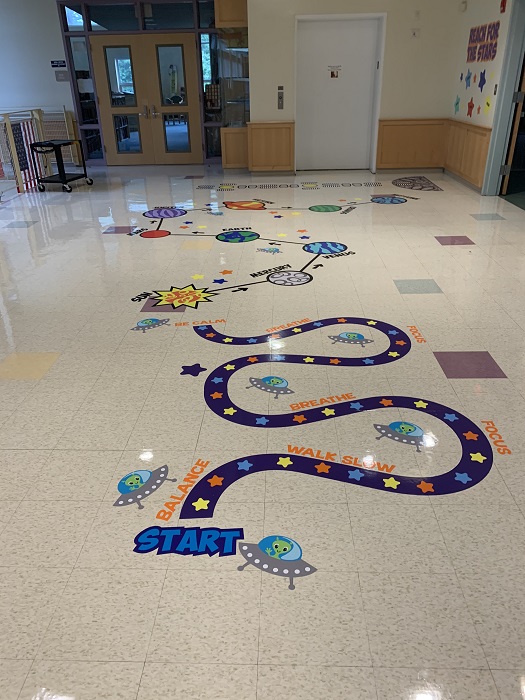
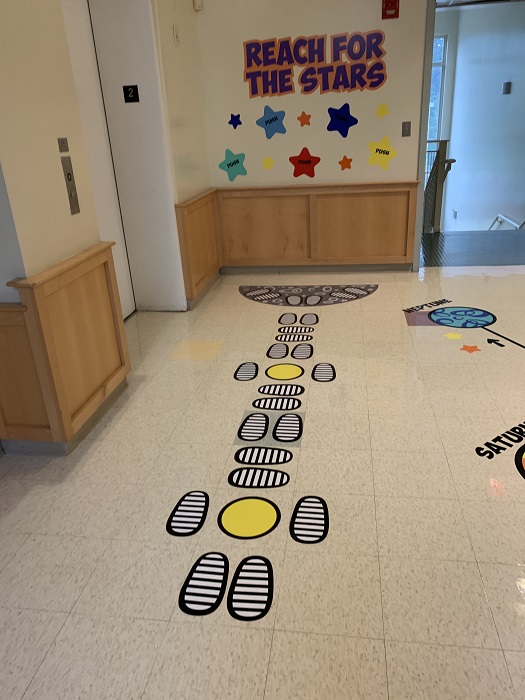
Cornell’s Diversity and Inclusion Certificate Program
Seema Meloni, one of the NEF’s co-presidents, recently spoke with Christopher Dancy, 6th grade science teacher at High Rock School, about his experience completing Cornell’s Diversity and Inclusion Certificate Program – professional development funded through an NEF grant. Here are some of the highlights from their conversation:
Q: For those unfamiliar with Cornell’s Diversity and Inclusion Certificate Program, could you please briefly explain the goals of the program and why you felt so compelled to enroll in the courses?
A: This certificate program represents a proactive response in addressing some of the inequities and tensions around xenophobia, homophobia, and racism that have been identified within NPS. While there has been a strong administrative response to these problems, NPS needs staff who have DEI (Diversity, Equity, and Inclusion) expertise grounded in best practices and not solely personal experience. While Cornell’s D&I program in itself is not a solution to these problems, the completion of this certificate program represents a great first step in gaining expertise in a field that is so necessary to the health of Needham Public Schools. I’m thrilled to have completed it and am proud to identify myself as a professional who is skilled in the pedagogy of the DEI space.
Q: How does DEI work best?
A: I am proud to have partnered with the NEF in order to further conversations regarding equity within the district. In the public schools, DEI work is implemented with the youngest of minds in moments of the day which are not publicized, visible, or recorded. DEI work happens in private and small group conversations, teachable moments, and as direct responses to student questions. DEI work is most successful when there is mutual trust, mutual respect, and engagement in the process. The true value of this grant is not based on quantitative outcomes, but instead its value is a lasting investment in the culture of the classroom and the larger school community. For that, I am deeply grateful.
Q: How can we address current events through a DEI lens?
A: What’s particularly interesting about the completion and implementation of this grant, is the timing. The first six months of 2020 have proven to be historically unprecedented. During this time the world has been gripped by pandemic, remote teaching and learning over Zoom has become a reality, while our fellow Americans protest as a response to racism and the murder of George Floyd.
Still, as teachers, we’ve continued to teach daily in this new remote paradigm.
Through a DEI lens, the themes of equity, access, healthcare, employment, family dynamics, as well as school-based support structures for our most fragile students (ELL, Needham students of color, LGBTIAQ+) have all been highlighted during this time in the most personal and profound of ways.
While I have always engaged headfirst into conversations associated with the DEI space, I left Cornell’s Diversity and Inclusion program with a more honed set of skills, especially in the areas of engagement and inclusion. For some of my students, there was rage and fear as they grasped for understanding about the reasons why George Floyd was murdered. For others, there were questions about why neighbors, classmates, and the public were supporting BLM in the streets. For a few, we engaged in developmentally appropriate conversations regarding how their own opinions and beliefs were contrary to an inclusive culture.
Q: Now that you have completed this Certificate Program, what’s next?
A: As we look ahead towards the last half of 2020, our tasks ahead do not look any easier. A few of our considerations are: DESE’s recommendations for schools reopening in the fall, surging cases of COVID-19 across the country, continued BLM protests in response to police brutality, and what will prove to be a very divisive Presidential election. This year, more than ever, we will need DEI-trained teachers in order to develop culturally responsive classrooms. I am up to the challenge and am grateful for the opportunity to be a more effective partner in service of our students.
Cooking with Kids
Cooking With Kids was approved during the Fall 2019 Grant Cycle to fund the purchase of ingredients for a weekly cooking activity. The goal was for students to learn life skills in early learning classrooms. The cooking activity provided opportunities for various service providers to collaborate, and serves as a chance for reverse inclusion in which ELC general education peers can help with the activity and provide appropriate peer modeling.
While the current school year didn’t unfold as expected, we are thrilled to see that the weekly cooking activity for Sunita Williams ELC students has continued virtually! Each week, a cooking project provides an opportunity for students to work on a range of skills while continuing to stay connected.
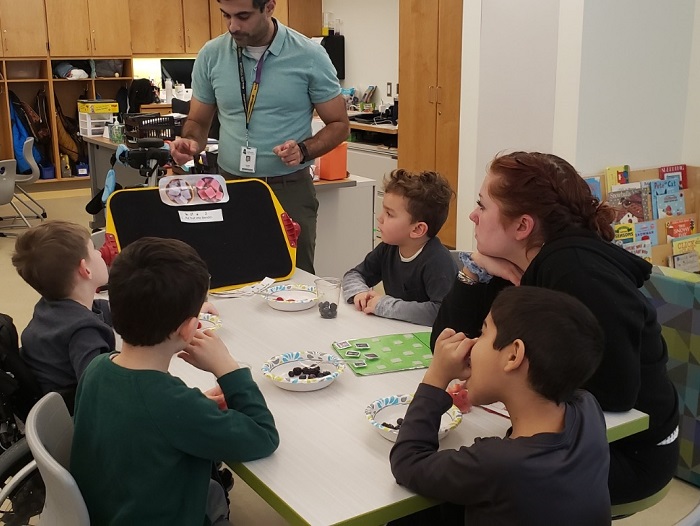
Making Space
This Fall 2018 grant funded a collaborative, school-wide art installation that visibly and functionally represents the mission to promote equity within Needham High School. The creation and installation of this structure will allow students and staff to explore important topics and have challenging conversations about race, gender, religion, sexual orientation, language, socioeconomic strata, immigration status, etc.
The NEF is very proud to have funded this grant at Needham High School to help students and staff continue their work on equity and inclusion.
History at Play
This February, all eighth grade students at Pollard Middle School experienced the immersive living history performance of “A Revolution of Her Own! The Life of Deborah Sampson.” Judith Kalaora, founder of History at Play, wrote, directed, and performed the piece. This particular performance was selected in collaboration with the League of Women Voters in Needham to celebrate the 100 year anniversary of the 19th amendment, which officially granted women the right to vote.
The intimate setting allowed students to be involved not only in watching, but also in interacting with the performer as Deborah Sampson. After the performance, students engaged in discussions about the messaging of gender roles in Revolutionary times and connected to the complexity of identity and gender in the current day. Many students found the performance powerful in its representation of a strong female character and appreciated being exposed to a different medium of history (i.e., a living history/oral history mode).
Teachers noted that the performance highlighted and breathed life into the voice of women from the Revolutionary War period, a voice that has been challenging to include. They also noted that students paid close attention and were engaged in the entire performance and subsequent discussions.
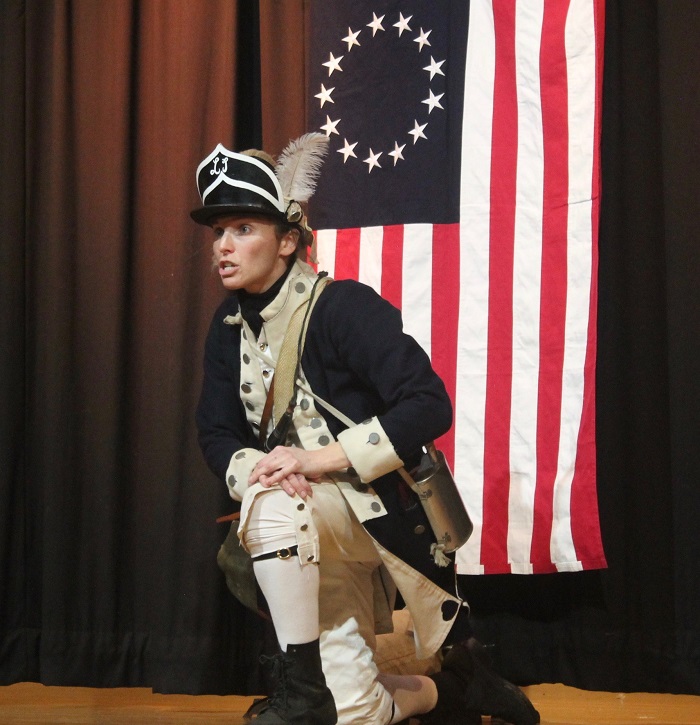
The Role of Women in History
Jen Deaderick, author and Equal Rights Amendment activist, came and spoke to high school students in February during the ‘NHS One Day’ workshops – focusing on the theme of community. Jen discussed the history of the women’s rights movement and its impact, as well as the community of women forged in the process. In addition, she read excerpts from her book, She the People, and answered questions from the students. Her appearance was made possible through a grant from the NEF.
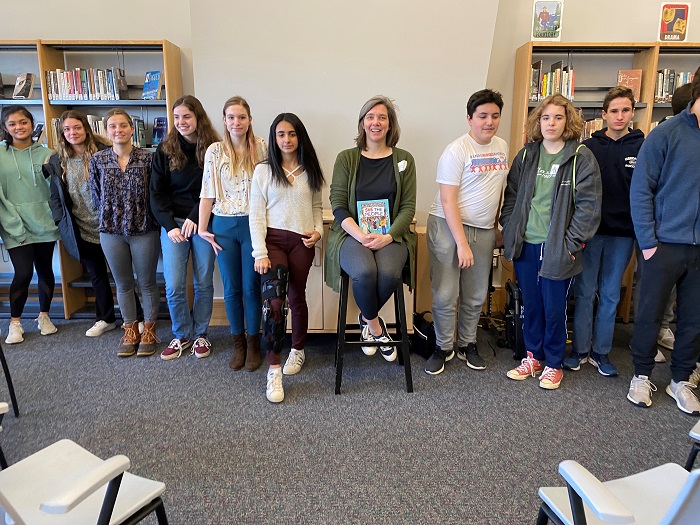
Hispanic Literacy Expansion
Students at High Rock have benefited from the expansion of Spanish-language and Latino-experience literature at the High Rock library. With funds from a Spring 2019 NEF grant, Spanish language learners can read authentic language materials targeted to their language level. In addition, the grant has provided grade level literature for native Spanish speakers.
Assistant Principal Maggie Charron commented, “Our goal for the Spanish program is to foster biliteracy,” and the literature collection afforded by this grant contributes to this goal. She continues to say, “Being biliterate can increase multicultural understanding, ….. and can increase a student’s ability to communicate with others.”
